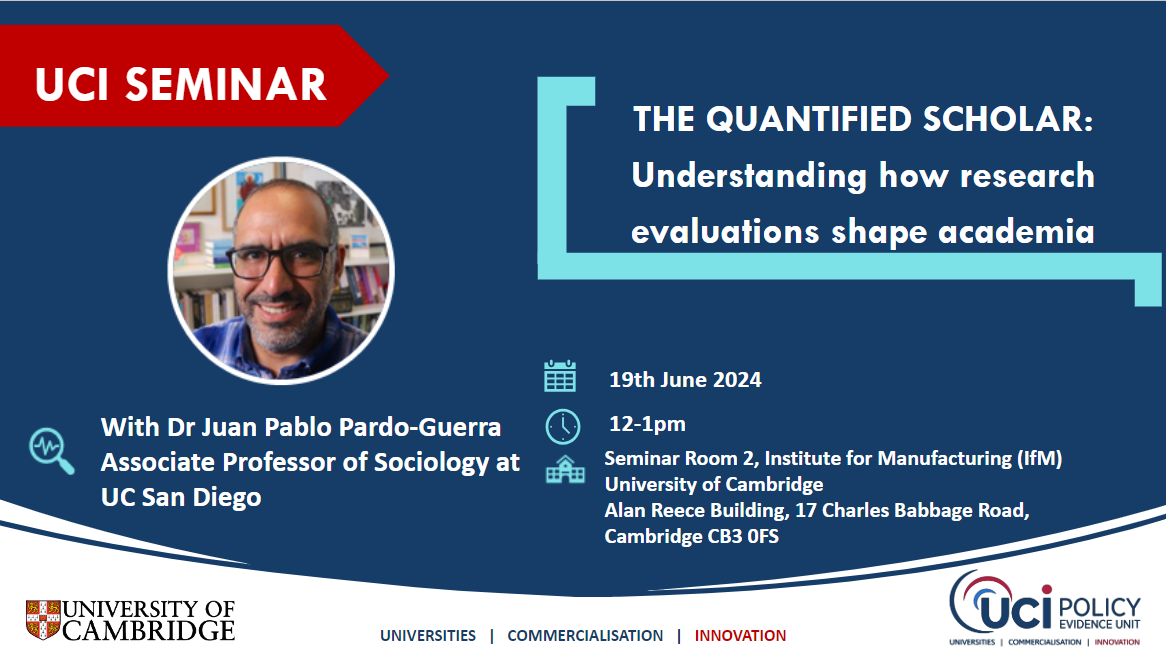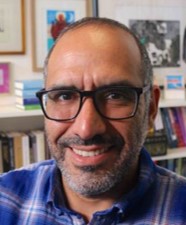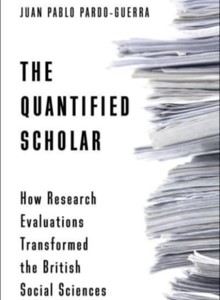‘The Quantified Scholar’: understanding the effects of research evaluation in academia

19th June 2024 @ 12-1pm
Seminar Room 2, Institute for Manufacturing, University of Cambridge
Seminar overview
Juan Pablo Pardo-Guerra’s research looks at how markets are built, work and transform their social worlds, from auction houses and finance to higher education and non-profit management. This seminar will focus in his work on ‘The Quantified Scholar’ where he studied the effect of quantifying knowledge on the organisation of disciplinary fields.
Using a combination of qualitative, historical, and computational methods, he shows how the introduction of standardised research evaluations to the British higher education system have shaped local academic labour markets, fostering specific patterns of interinstitutional mobility that altered the epistemic diversity of social science disciplines and the organization of their academic fields. Much like a market-based intervention, research evaluations lead to a form of epistemic matching that has distinct consequences on how social scientific knowledge is generated in Britain today. In particular, when evaluations affect organizational units (such as academic departments) and stress disciplinary norms, they foster forms of isomorphism that lead to reductions in a discipline’s thematic diversity and a more homogeneous structure for the field.
The seminar will invite us to reflect on current research evaluation standards and question how these insights can be applied to improve further assessment exercises and propose methodologically innovative research approaches to explore.
Chair: Tomas Ulrichsen Director of the Policy Evidence Unit for University Commercialisation and Innovation (UCI)
Time & Date
12-1pm, 19th June 2024
Venue
Seminar Room 2, Alan Reece Building, Institute for Manufacturing, 17 Charles Babbage Road, Cambridge CB3 0FS.
Speaker biography
|
|
Dr Juan Pablo Pardo-Guerra
Dr Juan Pablo Pardo-Guerra is associate professor of sociology at the University of California, San Diego. After training as a physicist at the Universidad Nacional Autónoma de México, he joined the Science Studies Unit of the University of Edinburgh, where he completed a PhD in Science and Technology Studies in 2010. Prior to joining UC San Diego, he was an assistant professor in sociology at the London School of Economics and Political Science. At UCSD, He is founding faculty of the Halicioglu Data Science Institute, co-founder of the Computational Social Science program, and Associate Director of the Latin American Studies Program. He is the author of Automating Finance: Infrastructures, Engineers, and the Making of Electronic Markets (Cambridge Press, 2019) and The Quantified Scholar: How research evaluations transformed the British Social Sciences (Columbia University Press, 2022).
|
|
|
The Quantified Scholar
Since 1986, the British government, faced with dwindling budgets and growing calls for public accountability, has sought to assess the value of scholarly work in the nation’s universities. Administrators have periodically evaluated the research of most full-time academics employed in British universities, seeking to distribute increasingly scarce funding to those who use it best. How do such attempts to quantify the worth of knowledge change the nature of scholarship?
|
For further information
For further information about the seminar and to join online, please contact Dr Valeria Ramirez at mvr26@cam.ac.uk.











